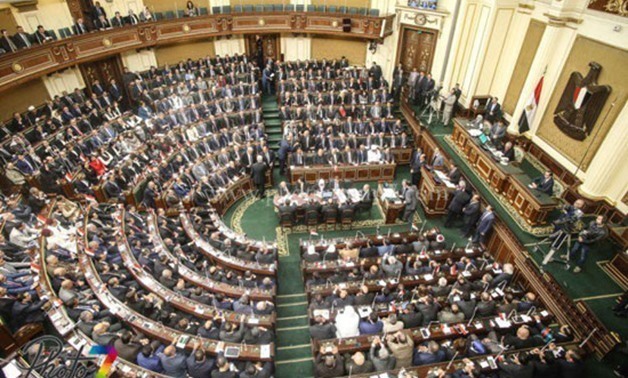
FILE - the Parliament
CAIRO – 27 April 2020: Egypt’s draft law on the development of small, medium and micro enterprises (SMEs) has exempted informal economy projects that will submit an application to reconcile their conditions from stamp duty.
In Article 27, the draft law included the exemption from documentation and a month fees for founding companies, establishments, credit facilities and mortgage contracts related to its business, in addition to other guarantees provided by the projects to obtain financing, for a period of five years from the date of their registration in the commercial registry.
The draft law that was approved by the Parliament also included that the land registration contracts necessary for the establishment of these projects shall be exempted from the taxes and fees.
Moreover, it included a package of tax and non-tax incentives to encourage young people to enter this sector. The SMEs sector provides a major driving force for sustainable economic growth, contributes significantly to the diversification of economic activities, enhances the competitiveness of the national economy, reduces poverty rates and enhances social stability, as it provides livelihoods for the largest segment of the population in both developed and developing countries alike.
According to the state owned statistics body, the number of informal sector establishments hit 2 million establishments, representing 53 percent of the total number of economic establishments, compared to 1.7 million formal private sector establishments, and 1.5 million public sector public enterprise establishments.
The number of workers in informal private sector enterprises is estimated at 4 million, representing 29.3 percent of the total number of workrs employed in economic establishments, compared to 8.6 million employed in the formal private sector and 881,900 employed in the public business sector.
In addition, the paid-up capital in the informal private sector is 69.3 percent, which represents only 5 percent of the total capital of economic establishments in general, compared to LE 877.2 billion for the formal private sector and LE 401.8 billion for the public sector and public works, according to the Central Agency for Public Mobilization and Statistics (CAPMAS).
CAPMAS clarified that the total profits of all enterprises in the informal private sector in 2019 reached LE 194.3 billion, compared to LE 1.2 trillion as the total profits of all enterprises in the formal private sector.
It also added that 36.9 percent of the total employment of the informal private sector is concentrated in the governorates of Cairo, Giza and Qaliubiya.
“Four economic activities account for 84.2 percent of the total number of workers employed in the informal sector; 52.9 percent of them are in the wholesale and retail trade, and repair of vehicles and motorcycles; 17 percent in manufacturing industries; 7.7 percent in food and accommodation services; and 6.6 percent in agriculture, forest exploitation and fishing,” CAPMAS stated.
The ratio of the informal sector to the total economic enterprises recorded a decrease between 2013/2018, from 55.5 percent to 53 percent. On the other hand, the number of informal enterprises increased from 1.3 million establishments to 2 million establishments. The total number of economic establishments increased from 2.8 million establishments to 4 million establishments, hence exceeding the increase in informal enterprises.
In 2019, Deputy Minister of Planning, Follow-up and Administrative Reform of Planning Ahmed Kamali said that Egypt is preparing to issue a law to merge the informal economy with the legitimate economic system.
Kamali added in a statement that the integration of the informal economy into the formal system of the economy helps combat poverty, which contributes significantly to the acceleration of growth.
He clarified that Egypt has two types of economy: official and informal, noting that workers in the informal economy represent 50 percent of all workers and that this type of economy records 40 percent of GDP.
Vice President of the Federation of Industries Tarek Tawfik said in April 2019 that the informal sector represents more than 50 percent of Egypt's economy.
The Central Bank of Egypt’s (CBE) Deputy Governor Gamal Negm previously said that the informal sector accounted for about 40 to 50 percent of the gross domestic product (GDP).
Meanwhile, the International Labour Organization revealed that informal workers in Egypt mark over 63 percent of the state’s estimated 30 million employed population.

Comments
Leave a Comment